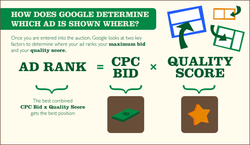
We had also seen that the auctioning system built from the ground up by Eric Veach for Google charged only a penny more than the second highest bid for the AdWords auction winner for a given keyword. This was surprisingly similar to the Vickery Auction model used by the US Federal Reserve to auction government securities. William Vickery was an economist and Nobel laureate. Veach had created his real-time auctioning system without being aware of the Vickery model! Simply amazing.
HOW THE VICKERY MODEL WORKS
In the traditional Vickery auction, “all bids are placed in a sealed envelope. When the envelopes are opened to determine the winner, the highest bid wins. But there’s a twist. The winner doesn’t pay his or her bid. Instead, the winner only has to pay the second highest bid,” says Avinash Dixit and Barry Nalebuff in their celebrated Game Theory work, The Art of Strategy.
Notice that this is slightly at variance with the real-time AdWords auctions, which takes place online, and where the winner has to pay only a penny more than the next highest bid. Dixit and Nalebuff explain using clear illustrations that in a Vickery auction, bidders have the ‘Dominant Strategy’ of bidding their true valuation. They go on to define Dominant Strategy as the best play of an auction participant, no matter what others are doing.
English and Japanese auctions are two other formats which exist at slight variance to the Vickery Auction model. In the English Auction used by auctioneers like Sotheby’s or Christie’s, the auctioneer stands in a room calling out bids which increase at every call. The authors say that in an English auction, “a bidder learns something about what others think the item is worth by seeing some of their bids”. Their advice to bidders in an English Auction is that they have to bid until the price exceeds their ‘Value’, and then drop out. Dixit and Nalebuff define Value as the bidder’s “walkaway number…the highest price at which the bidder will still want to win the item”.
In the Japanese Auction, “all the bidders start with their hands raised or buttons pressed. The bidding goes up via a clock. The clock might start at 30, and then proceed to 31, 32…and upwards. So long as your hand is raised, you are in the bidding. You drop out by lowering your hand. The catch is that once you lower your hand, you can’t put it back up again. The auction ends when only one bidder remains.
“An advantage of the Japanese Auction is that it’s always clear how many bidders are active. In an English Auction, someone can remain silent even though they were willing to bid all along. The person can then make a surprise entry late in the contest.”
So in the Japanese auction, everyone sees where everyone drops out. In contrast, the authors say, bidders in a Vickery Auction doesn’t get a chance to learn anything about the other bids until the auction is all over. Again, in both the Japanese and English auctions, what the winning bidder has to pay is the second highest bid amount.
THE DUTCH AUCTION
Google is also famous for using the Dutch auction to pick buyers for its shares when it first went for a stock market listing in 2004. Dixit and Nalebuff say that in the Dutch Auction, which is used to sell flowers in the Netherlands at places like Aalsmeer, the process is the reverse of the Japanese Auction. Here the auction starts with a high price that declines. “Imagine a clock that starts at 100 and then winds down to 99, 98…The first person to stop the clock wins the auction and pays the price at which the clock was stopped.”
e.o.m.
 RSS Feed
RSS Feed
